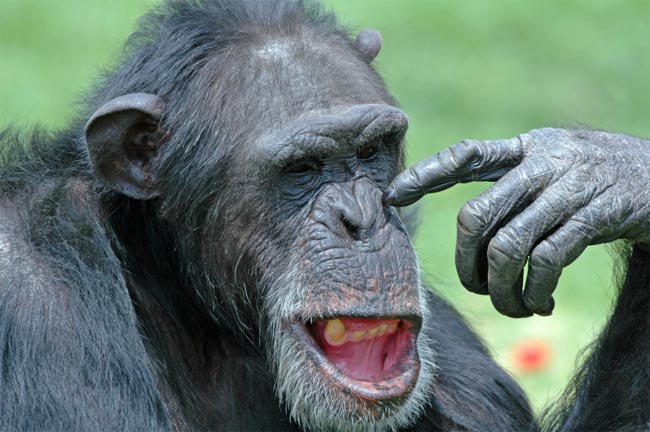Men Are Like Apes When Competing for Status

Apes are showing themselves to be more and more like humans, as various studies suggest they share much of our DNA, pass on culture and even understand and mourn death.
Now a new study reveals the hormone changes linked to competition in bonobos and chimpanzees mirror those in human guys vying for, say, mates or status.
"These findings suggest that men's psychological and physiological sensitivity to competition is not simply a result of living in a competitive human society," said Victoria Wobber, a Harvard graduate student and first author of the study. "Instead, it appears that when our ancestors diverged from chimpanzees and bonobos, individuals would have been similarly responsive to competitive events, with this evolutionarily inherited in humans."
Sweet Tarts and saliva
The researchers tested hormone changes by setting up potentially competitive situations in which a pair of male bonobos or male chimpanzees observed a pile of food being placed in an adjacent "testing" room. Then the pair was brought into that room and left to eat, or not.
Researchers used swabs dipped in Sweet Tarts candy to take saliva samples from the apes immediately before each trial, before the food was presented but after the individuals were placed in the pairing, and 15 minutes after the last trial.
"We knew that this candy stimulated saliva without changing steroid levels, so we needed to use that particular candy, but it needed to be in powder form," Wobber told LiveScience. "So, I spent countless hours grinding Sweet Tarts with a mortar and pestle - fortunately, both species loved the resulting powder, meaning that the hours were worthwhile!"
Sign up for the Live Science daily newsletter now
Get the world’s most fascinating discoveries delivered straight to your inbox.
The dominant ape of each pair monopolized the food about 50 percent of the time, with the two sharing the food during the other half of the time.
Competition hormones
In the non-sharing scenarios, males of both species showed hormonal changes in anticipation of competing for the food, though the changes were different for each species.
Male chimpanzees showed an increase in testosterone, a hormone associated with competition and aggressive interactions. Male bonobos, however, showed an increase in cortisol, which is linked with stress and more passive social strategies in animals.
"Chimpanzee males reacted to the competition as if it was a threat to their status, while bonobos reacted as if a potential competition is stressful by showing changes in their cortisol levels," Wobber said.
The hormone changes occurred even before the pair competed for food, suggesting both primates could predict whether the situation would result in cooperation or not.
"These cortisol increases occurred in both individuals in the non-sharing pairs [of bonobos] – both the dominant and the subordinate," Wobber said. "Thus even the individual who was going to get more food was 'stressed' by the situation of food not being divided equally between individuals."
Evolution of aggression
The results make sense seeing as chimpanzees live in male-dominated societies where status is paramount, and dominant ranking is achieved through aggressive behaviors . In bonobo societies, the most dominant individuals are female, and tolerance allows the male animals to cooperate with one another and share food.
When chimpanzees and bonobos diverged, bonobos seem to have evolved a non-aggressive coping style when stressed, while chimpanzees kept the ancestral "fighting" state.
The new study suggests these different behavioral states evolved alongside the corresponding changes in hormone levels.
How men act like apes
Men who cope with competition like bonobos – that is, passively – also show changes in cortisol levels, past research shows. To these guys, competition is more of a stressor than a status-determining event. Other studies have shown some men respond to competition more like chimpanzees and experience changes in testosterone levels.
But the jury is still out on whether the same guy would experience different hormone changes depending on the situation.
"It's actually an area for future research whether the same man, presented with different events, would react differently, being chimpanzee-like in one situation and bonobo-like in another, or show a similar profile across situations, being always chimpanzee-like, for example," Wobber said.
Something unique about human males is that after competition they experience an increase in testosterone if they win or a decrease if they lose, accounting for giddy or depressed sports fans following a win or loss. This post-competition change wasn't seen in the apes.
The research was published on June 28 in the journal Proceedings of the National Academy of Sciences.
Jeanna Bryner is managing editor of Scientific American. Previously she was editor in chief of Live Science and, prior to that, an editor at Scholastic's Science World magazine. Bryner has an English degree from Salisbury University, a master's degree in biogeochemistry and environmental sciences from the University of Maryland and a graduate science journalism degree from New York University. She has worked as a biologist in Florida, where she monitored wetlands and did field surveys for endangered species, including the gorgeous Florida Scrub Jay. She also received an ocean sciences journalism fellowship from the Woods Hole Oceanographic Institution. She is a firm believer that science is for everyone and that just about everything can be viewed through the lens of science.
Why is yawning contagious?
Scientific consensus shows race is a human invention, not biological reality









